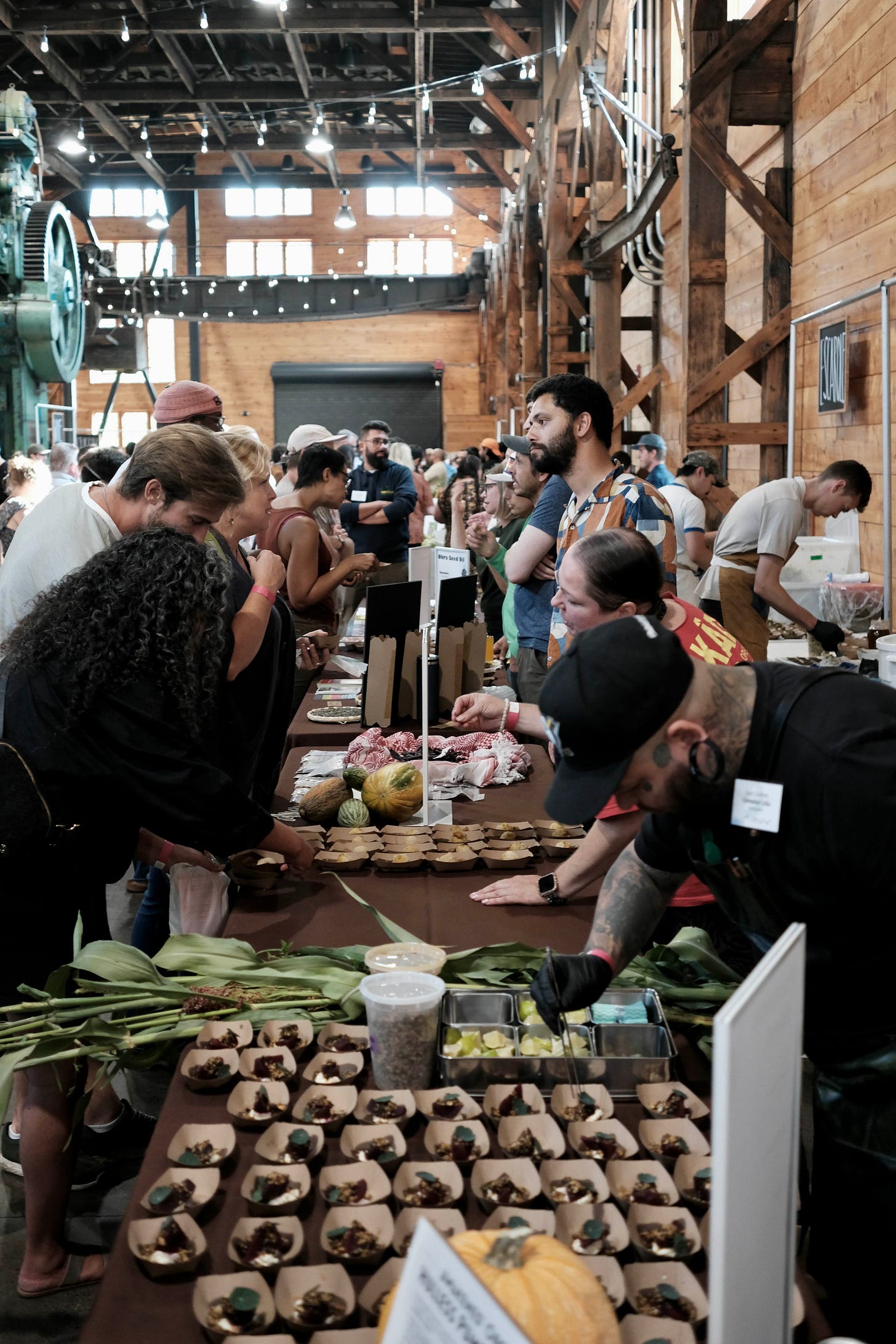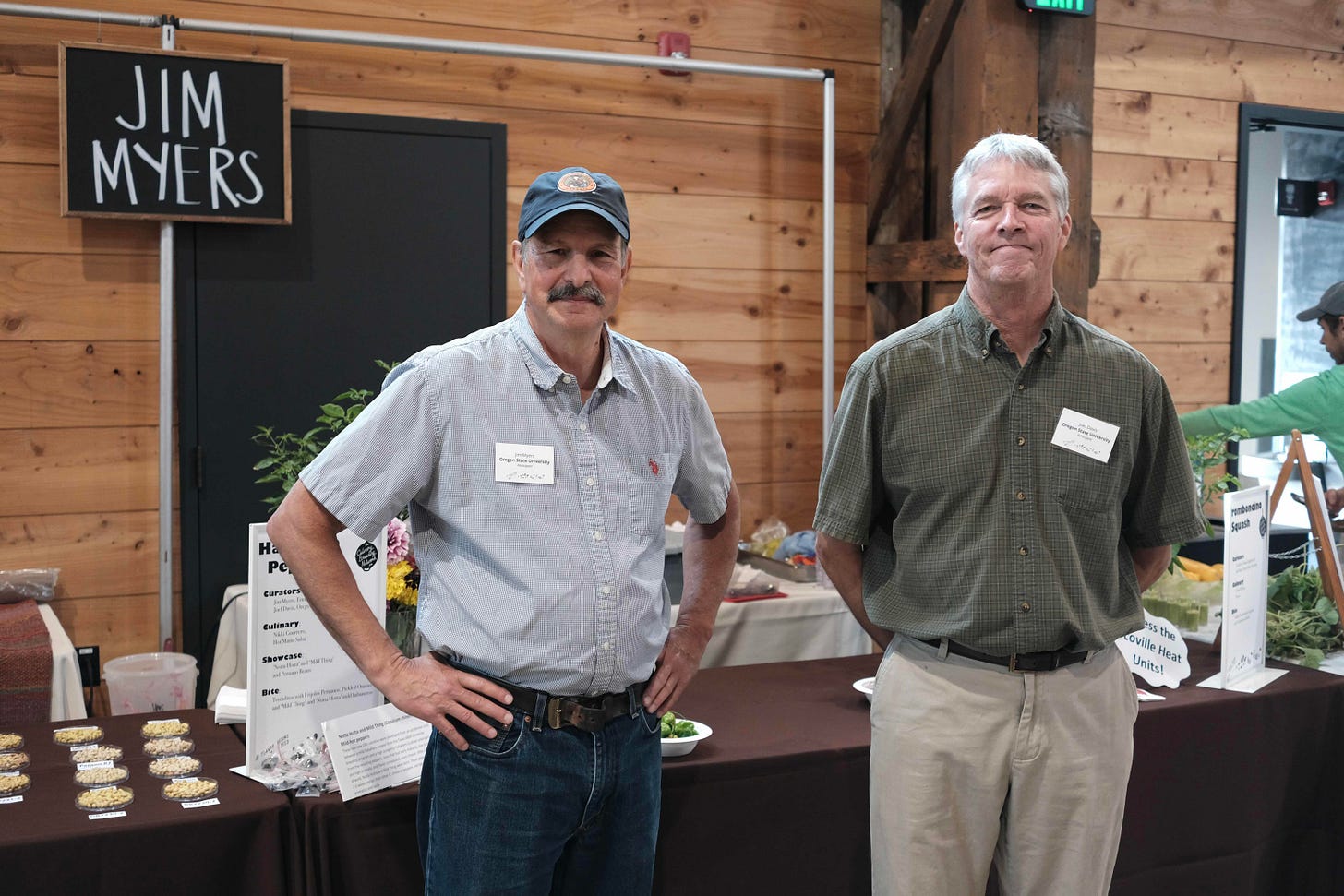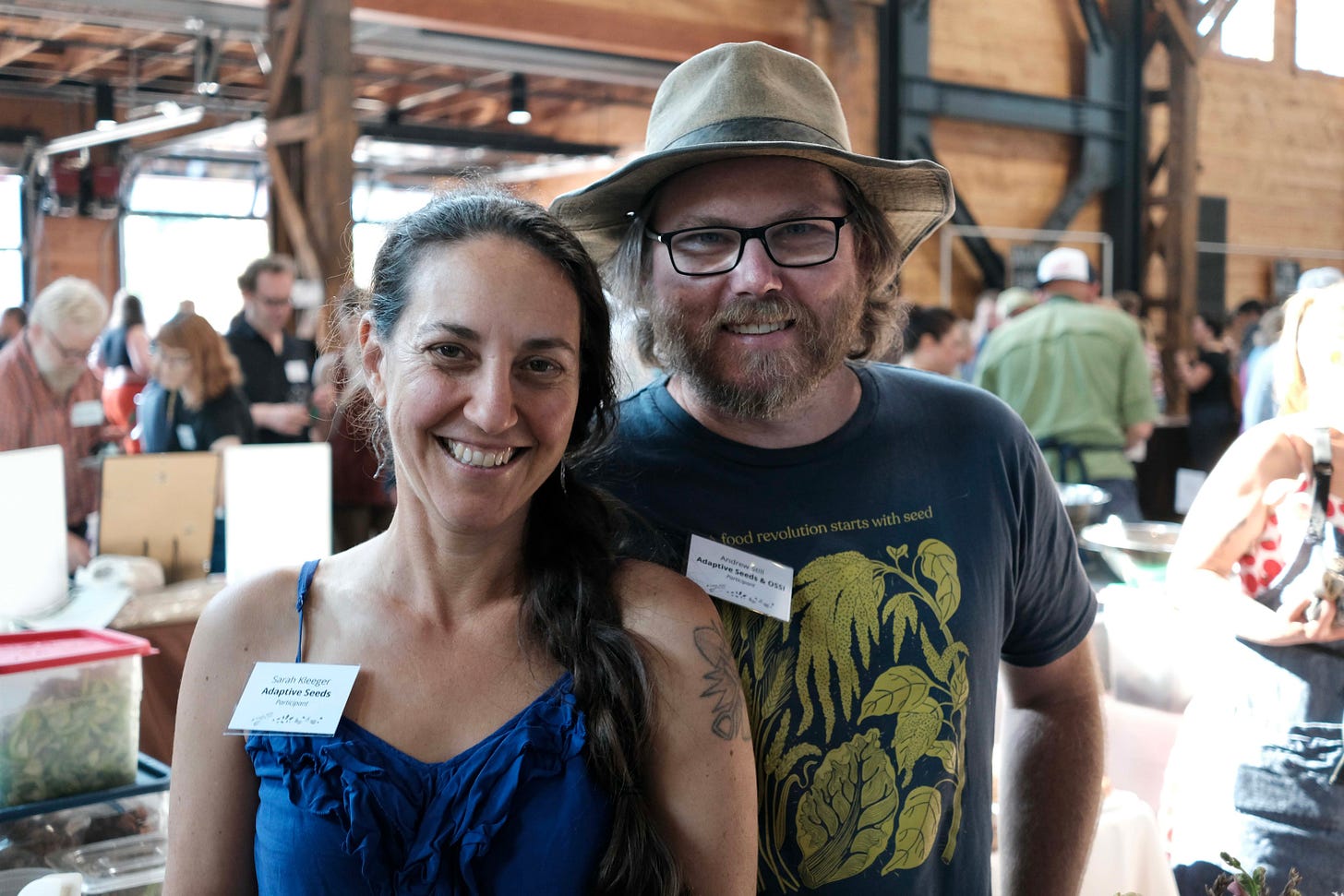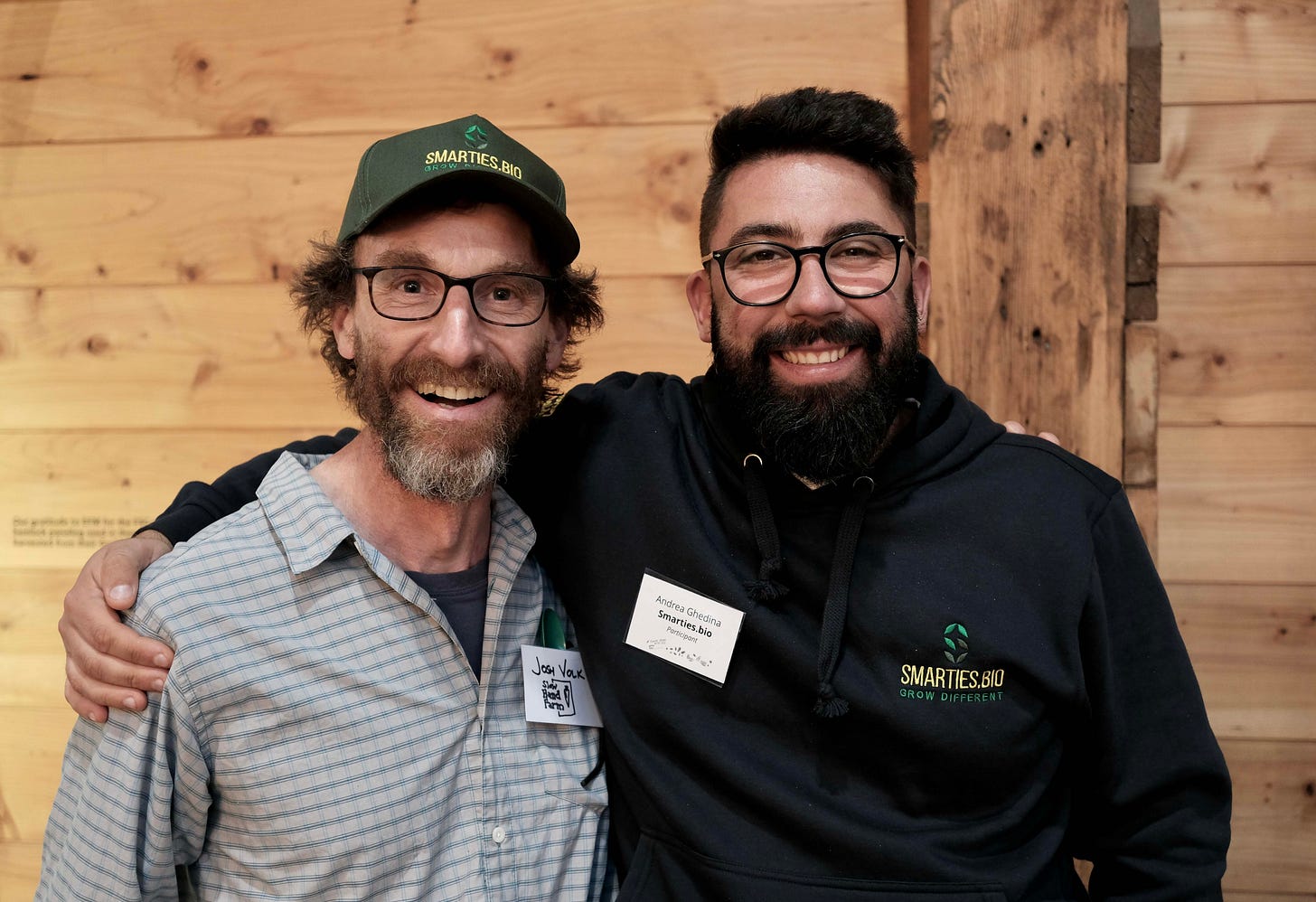My intention for this trip was to explore how diversity can bring resilience to our seed and food system. My motivation was largely driven by the facts and the science: the current legislation in the UK that contributes to reduced genetic diversity in crops, and the alarming lack of organic seed that is grown and produced on our soils. I could see the potential in participatory breeding to address both these issues, and the thriving seed network in the Pacific Northwest seemed the perfect place to better understand what might be possible. On my travels, I have visited and met with some incredible folks, and what I have come to recognise time and time again is that diversity is not something we can create outside of relationship. Diversity transcends individuals, it flourishes in collaboration, in sharing, and in collective care.
It was rather poetic then, that the final few days of my trip coincided with the 10th anniversary of the Culinary Breeding Network’s Variety Showcase – the ultimate catalyst for community building and collaboration within this network.
The event, held annually, is dedicated to illuminating the significance of organic seed and emphasising inclusivity in the plant breeding process for all members of the food system. When I first arrived in the US back in May, I spent my first week with Lane Selman from the Culinary Breeding Network, and many of the people I had subsequently met on my travels were planning on attending the event, so it was with much anticipation that I said farewell to Canada to make my way back into the US and down to Portland.
Held in the Redd in Portland’s Central Eastside Industrial District, the Variety Showcase draws attendees from the US, Canada and beyond. The sold-out event ran for 4 hours on a sunny September Sunday afternoon, and as part of the volunteer team helping Lane throughout the day, I got behind the scenes experience of how an event like this comes together.
In the months running up to the event, plant breeders, researchers and farmers are partnered with local chefs, who devise exclusive dishes featuring the specific cultivar or line the breeder has been working on. These groups are then each allocated a table at the event to showcase both the seed and culinary work. The space was set out with some 40 stations, each spotlighting organic breeding and seed work.
Lane’s goal for these events is ‘to shed light on the importance of organic seed and engage everyone in the plant breeding process’. The intention is to bridge the gap between eaters and breeders, encouraging conversation and sharing of opinions. The delicious dishes, created by the chefs, celebrate the work of the plant breeder while also showcasing the diversity and potential of organic seed. Attendees have the unique experience of tasting these new and in-development vegetable, fruit and grain cultivars, and giving direct feedback to the breeders. The event offers the rare opportunity to chat directly to those making big decisions behind the scenes.
Many of us are often working away in silos, heads down, busy with the day to day - inadvertently isolating ourselves. The Variety Showcase breaks down all these barriers. For members of the public who attend, it’s a rare glimpse into the organic seed world, allowing them to gain a greater understanding of plant breeding’s role in shaping the food that they eat. And for the farmers, breeders and researchers, it’s all about strengthening their connection to those who eat their food, enabling them to make decisions on the plant breeding process based on direct feedback.
‘The Variety Showcase has been wonderful for me because by working with chefs, I’ve gained new perspectives on the crops I am breeding. This is particularly important for those crops which don’t really fit existing market specs. I think that participatory plant breeding is generally important because it provides direct feedback on breeding needs and objectives and keeps the breeder from developing materials that don’t suit the end users.’ Jim Myers, OSU.
As well as celebrating food diversity within the organic seed network, the event also addresses some of the crucial issues in farming. The 10th anniversary showcase had a special emphasis on Dry Farming, looking at alternative ways of producing food in these times of climate chaos. Attendees had the opportunity to learn all about the agricultural techniques being used to address our shifting climate directly from the farmers and researchers carrying out this important work. From melons to zucchinis to dry beans, crops that perform well under dry farm conditions were showcased at their peak and transformed into mouth-watering bites that celebrated their culinary attributes. Culinary grains also featured prominently at the event – with chefs and bakers collaborating with university breeding programmes and researchers to shine a spotlight on alternatives to industrial processed wheat. There were galettes and crackers and ginger scones galore, alongside sumptuous loaves of freshly baked bread, all raising the profile of the potential of alternative grains.
Many of the seed companies I have visited over the past 4 months attended the Variety Showcase – embracing the opportunity to get together and celebrate. And celebrate they did! My main takeaway from the event, from setup to break down and beyond, was the sheer joy that it seemed to bring about. Everyone involved, from Lane and her amazing team of volunteers to the participants and the attendees, seemed just so incredibly happy to be there. The Redd was the perfect venue to create a festival atmosphere, and with nearly 700 people from all parts of the food sector attending, the event certainly felt like a celebration.
The Variety Showcase offers everyone who attends the freedom to play and explore and form connections. From art exhibits displaying the beauty that can be found in everyday fruit and vegetables, to tastings of bourbon made from local corn, and plump beetroot mochi’s that had people queueing for more. The event brings people together with purpose and creativity, an opportunity to celebrate each other and everyones hard work.
The power of this event once again lies in relationship. If the Variety Showcase didn’t happen, I imagine all the stake holders involved would still continue doing what they do: breeding plants, growing crops, developing culinary dishes. But in coming together, in fostering connections through this brilliant event, their collective impact is far greater. Relationships develop, stories are shared, memories are created, community emerges and suddenly the seed has more meaning than simply being just another variety of lettuce. Crops are assimilated into community and culture, and diversity thrives. In bringing all these people together under one roof, the Culinary Breeding Network Variety Showcase has a profound impact, lasting far beyond just the one afternoon it is held each year.











